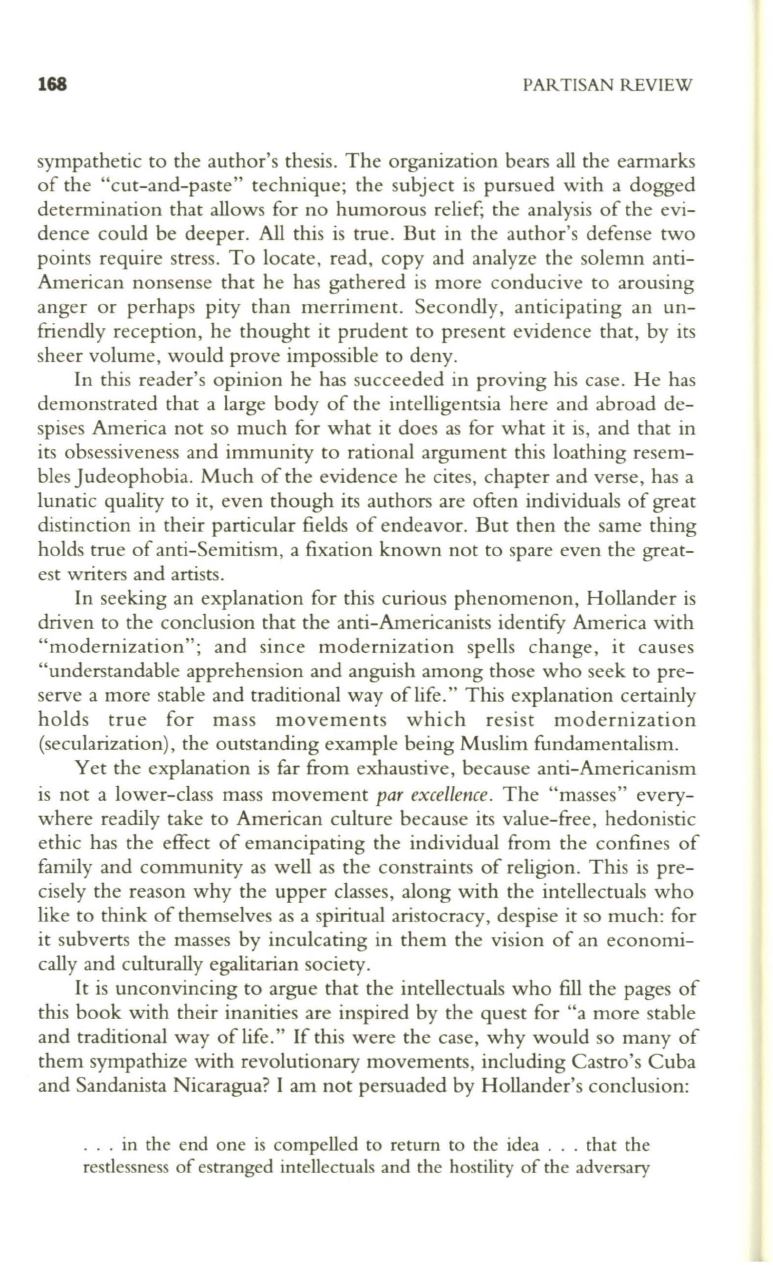
168
PARTISAN REVIEW
sympathetic to the author's thesis. The organization bears all the earmarks
of the "cut-and-paste" technique; the subject is pursued with a dogged
determination that allows for no humorous relief; the analysis of the evi–
dence could be deeper. All this is true. But in the author's defense two
points require stress. To locate, read, copy and analyze the solemn anti–
American nonsense that he has gathered is more conducive to arousing
anger or perhaps pity than merriment. Secondly, anticipating an un–
friendly reception, he thought it prudent to present evidence that, by its
sheer volume, would prove impossible to deny.
In this reader's opinion he has succeeded in proving his case. He has
demonstrated that a large body of the intelligentsia here and abroad de–
spises America not so much for what it does as for what it is, and that in
its obsessiveness and immunity to rational argument this loathing resem–
bles Judeophobia. Much of the evidence he cites, chapter and verse, has a
lunatic quality to it, even though its authors are often individuals of great
distinction in their particular fields of endeavor. But then the same thing
holds true of anti-Semitism, a fixation known not to spare even the great–
est writers and artists.
In seeking an explanation for this curious phenomenon, Hollander is
driven to the conclusion that the anti-Americanists identify America with
"modernization"; and since modernization spells change, it causes
"understandable apprehension and anguish among those who seek to pre–
serve a more stable and traditional way of life." This explanation certainly
holds true for mass movements which resist modernization
(secularization), the outstanding example being Muslim fundamentalism.
Yet the explanation is far from exhaustive, because anti-Americanism
is not a lower-class mass movement
par excellence.
The "masses" every–
where readily take to American culture because its value-free, hedonistic
ethic has the effect of emancipating the individual from the confines of
family and community as well as the constraints of religion. This is pre–
cisely the reason why the upper classes, along with the intellectuals who
like to think of themselves as a spiritual aristocracy, despise it so much: for
it subverts the masses by inculcating in them the vision of an economi–
cally and culturally egalitarian society.
It
is unconvincing to argue that the intellectuals who fill the pages of
this book with their inanities are inspired by the quest for "a more stable
and traditional way of life." If this were the case, why would so many of
them sympathize with revolutionary movements, including Castro's Cuba
and Sandanista Nicaragua? I am not persuaded by Hollander's conclusion:
... in the end one is compelled to return to the idea ... that the
restlessness of estranged intellectuals and the hostility of the adversary


